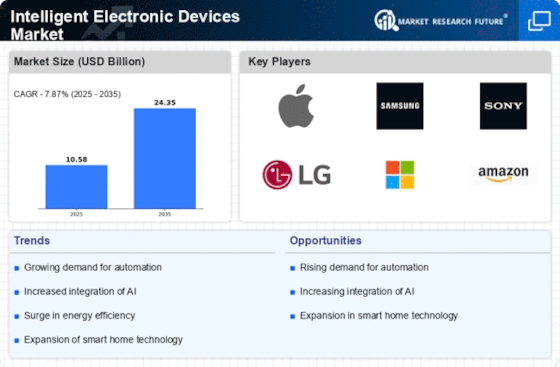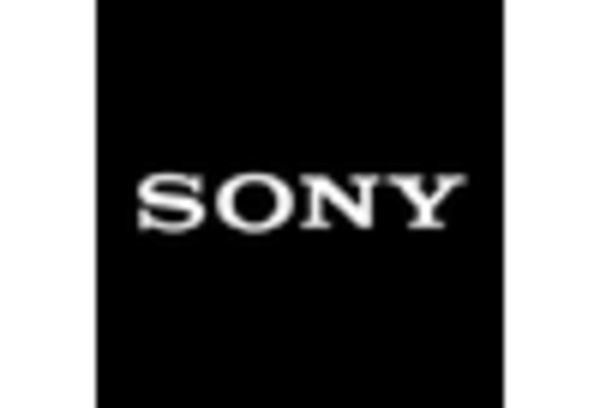Protective Relaying Device
On-Load Tap Changer Controller
Circuit Breaker Controller
Capacitor Bank Switch
Recloser Controller
Voltage Regulator
Digital Relay
Others
Mass Transit System
Traction Signaling & Control System
Water Supply & Management System
Automation
Condition Monitoring
Oil & Gas
Food & Beverage
Automotive
Energy & Power
Pharmaceutical
Chemicals
Others
North America Intelligent Electronic Devices by TypeProtective Relaying Device
On-Load Tap Changer Controller
Circuit Breaker Controller
Capacitor Bank Switch
Recloser Controller
Voltage Regulator
Digital Relay
Others
North America Intelligent Electronic Devices by ApplicationMass Transit System
Traction Signaling & Control System
Water Supply & Management System
Automation
Condition Monitoring
North America Intelligent Electronic Devices by VerticalOil & Gas
Food & Beverage
Automotive
Energy & Power
Pharmaceutical
Chemicals
Other
US Intelligent Electronic Devices by TypeProtective Relaying Device
On-Load Tap Changer Controller
Circuit Breaker Controller
Capacitor Bank Switch
Recloser Controller
Voltage Regulator
Digital Relay
Others
USIntelligent Electronic Devices by ApplicationMass Transit System
Traction Signaling & Control System
Water Supply & Management System
Automation
Condition Monitoring
US Intelligent Electronic Devices by VerticalOil & Gas
Food & Beverage
Automotive
Energy & Power
Pharmaceutical
Chemicals
Others
CANADA Intelligent Electronic Devices by TypeProtective Relaying Device
On-Load Tap Changer Controller
Circuit Breaker Controller
Capacitor Bank Switch
Recloser Controller
Voltage Regulator
Digital Relay
Others
CANADAIntelligent Electronic Devices by ApplicationMass Transit System
Traction Signaling & Control System
Water Supply & Management System
Automation
Condition Monitoring
CANADA Intelligent Electronic Devices by VerticalOil & Gas
Food & Beverage
Automotive
Energy & Power
Pharmaceutical
Chemicals
Others
Europe Intelligent Electronic Devices by TypeProtective Relaying Device
On-Load Tap Changer Controller
Circuit Breaker Controller
Capacitor Bank Switch
Recloser Controller
Voltage Regulator
Digital Relay
Others
EuropeIntelligent Electronic Devices by ApplicationMass Transit System
Traction Signaling & Control System
Water Supply & Management System
Automation
Condition Monitoring
Europe Intelligent Electronic Devices by VerticalOil & Gas
Food & Beverage
Automotive
Energy & Power
Pharmaceutical
Chemicals
Others
Germany Intelligent Electronic Devices by TypeProtective Relaying Device
On-Load Tap Changer Controller
Circuit Breaker Controller
Capacitor Bank Switch
Recloser Controller
Voltage Regulator
Digital Relay
Others
GermanyIntelligent Electronic Devices by ApplicationMass Transit System
Traction Signaling & Control System
Water Supply & Management System
Automation
Condition Monitoring
Germany Intelligent Electronic Devices by VerticalOil & Gas
Food & Beverage
Automotive
Energy & Power
Pharmaceutical
Chemicals
Others
France Intelligent Electronic Devices by TypeProtective Relaying Device
On-Load Tap Changer Controller
Circuit Breaker Controller
Capacitor Bank Switch
Recloser Controller
Voltage Regulator
Digital Relay
Others
FranceIntelligent Electronic Devices by ApplicationMass Transit System
Traction Signaling & Control System
Water Supply & Management System
Automation
Condition Monitoring
France Intelligent Electronic Devices by VerticalOil & Gas
Food & Beverage
Automotive
Energy & Power
Pharmaceutical
Chemicals
Others
UK Intelligent Electronic Devices by TypeProtective Relaying Device
On-Load Tap Changer Controller
Circuit Breaker Controller
Capacitor Bank Switch
Recloser Controller
Voltage Regulator
Digital Relay
Others
UKIntelligent Electronic Devices by ApplicationMass Transit System
Traction Signaling & Control System
Water Supply & Management System
Automation
Condition Monitoring
UK Intelligent Electronic Devices by VerticalOil & Gas
Food & Beverage
Automotive
Energy & Power
Pharmaceutical
Chemicals
Others
ITALY Intelligent Electronic Devices by TypeProtective Relaying Device
On-Load Tap Changer Controller
Circuit Breaker Controller
Capacitor Bank Switch
Recloser Controller
Voltage Regulator
Digital Relay
Others
ITALYIntelligent Electronic Devices by ApplicationMass Transit System
Traction Signaling & Control System
Water Supply & Management System
Automation
Condition Monitoring
Oil & Gas
Food & Beverage
Automotive
Energy & Power
Pharmaceutical
Chemicals
Others
Spain Intelligent Electronic Devices by TypeProtective Relaying Device
On-Load Tap Changer Controller
Circuit Breaker Controller
Capacitor Bank Switch
Recloser Controller
Voltage Regulator
Digital Relay
Others
SpainIntelligent Electronic Devices by ApplicationMass Transit System
Traction Signaling & Control System
Water Supply & Management System
Automation
Condition Monitoring
Spain Intelligent Electronic Devices by VerticalOil & Gas
Food & Beverage
Automotive
Energy & Power
Pharmaceutical
Chemicals
Others
Rest Of Europe Intelligent Electronic Devices by TypeProtective Relaying Device
On-Load Tap Changer Controller
Circuit Breaker Controller
Capacitor Bank Switch
Recloser Controller
Voltage Regulator
Digital Relay
Others
REST OF EUROPEIntelligent Electronic Devices by ApplicationMass Transit System
Traction Signaling & Control System
Water Supply & Management System
Automation
Condition Monitoring
REST OF EUROPE Intelligent Electronic Devices by VerticalOil & Gas
Food & Beverage
Automotive
Energy & Power
Pharmaceutical
Chemicals
Others
Asia-Pacific Intelligent Electronic Devices by TypeProtective Relaying Device
On-Load Tap Changer Controller
Circuit Breaker Controller
Capacitor Bank Switch
Recloser Controller
Voltage Regulator
Digital Relay
Others
Asia-PacificIntelligent Electronic Devices by ApplicationMass Transit System
Traction Signaling & Control System
Water Supply & Management System
Automation
Condition Monitoring
Asia-Pacific Intelligent Electronic Devices by VerticalOil & Gas
Food & Beverage
Automotive
Energy & Power
Pharmaceutical
Chemicals
Others
China Intelligent Electronic Devices by TypeProtective Relaying Device
On-Load Tap Changer Controller
Circuit Breaker Controller
Capacitor Bank Switch
Recloser Controller
Voltage Regulator
Digital Relay
Others
ChinaIntelligent Electronic Devices by ApplicationMass Transit System
Traction Signaling & Control System
Water Supply & Management System
Automation
Condition Monitoring
China Intelligent Electronic Devices by VerticalOil & Gas
Food & Beverage
Automotive
Energy & Power
Pharmaceutical
Chemicals
Others
Japan Intelligent Electronic Devices by TypeProtective Relaying Device
On-Load Tap Changer Controller
Circuit Breaker Controller
Capacitor Bank Switch
Recloser Controller
Voltage Regulator
Digital Relay
Others
JapanIntelligent Electronic Devices by ApplicationMass Transit System
Traction Signaling & Control System
Water Supply & Management System
Automation
Condition Monitoring
Japan Intelligent Electronic Devices by VerticalOil & Gas
Food & Beverage
Automotive
Energy & Power
Pharmaceutical
Chemicals
Others
India Intelligent Electronic Devices by TypeProtective Relaying Device
On-Load Tap Changer Controller
Circuit Breaker Controller
Capacitor Bank Switch
Recloser Controller
Voltage Regulator
Digital Relay
Others
IndiaIntelligent Electronic Devices by ApplicationMass Transit System
Traction Signaling & Control System
Water Supply & Management System
Automation
Condition Monitoring
India Intelligent Electronic Devices by VerticalOil & Gas
Food & Beverage
Automotive
Energy & Power
Pharmaceutical
Chemicals
Others
India Intelligent Electronic Devices by End-UserEDUCATION
BFSI
RETAIL
Telecomm
IT
Australia Intelligent Electronic Devices by TypeProtective Relaying Device
On-Load Tap Changer Controller
Circuit Breaker Controller
Capacitor Bank Switch
Recloser Controller
Voltage Regulator
Digital Relay
Others
AustraliaIntelligent Electronic Devices by ApplicationMass Transit System
Traction Signaling & Control System
Water Supply & Management System
Automation
Condition Monitoring
Australia Intelligent Electronic Devices by VerticalOil & Gas
Food & Beverage
Rest of Asia-Pacific Intelligent Electronic Devices by TypeProtective Relaying Device
On-Load Tap Changer Controller
Circuit Breaker Controller
Capacitor Bank Switch
Recloser Controller
Voltage Regulator
Digital Relay
Others
Rest of Asia-PacificIntelligent Electronic Devices by ApplicationMass Transit System
Traction Signaling & Control System
Water Supply & Management System
Automation
Condition Monitoring
Rest of Asia-Pacific Intelligent Electronic Devices by VerticalOil & Gas
Food & Beverage
Rest of the World Intelligent Electronic Devices by TypeProtective Relaying Device
On-Load Tap Changer Controller
Circuit Breaker Controller
Capacitor Bank Switch
Recloser Controller
Voltage Regulator
Digital Relay
Others
Rest of the WorldIntelligent Electronic Devices by ApplicationMass Transit System
Traction Signaling & Control System
Water Supply & Management System
Automation
Condition Monitoring
Rest of the World Intelligent Electronic Devices by VerticalOil & Gas
Food & Beverage
Automotive
Energy & Power
Pharmaceutical
Chemicals
Others
Middle East Intelligent Electronic Devices by TypeProtective Relaying Device
On-Load Tap Changer Controller
Circuit Breaker Controller
Capacitor Bank Switch
Middle EastIntelligent Electronic Devices by ApplicationMass Transit System
Traction Signaling & Control System
Water Supply & Management System
Automation
Condition Monitoring
Middle East Intelligent Electronic Devices by VerticalOil & Gas
Food & Beverage
Automotive
Energy & Power
Pharmaceutical
Chemicals
Others
Africa Intelligent Electronic Devices by TypeProtective Relaying Device
On-Load Tap Changer Controller
Circuit Breaker Controller
Capacitor Bank Switch
Recloser Controller
Voltage Regulator
Digital Relay
Others
AfricaIntelligent Electronic Devices by ApplicationMass Transit System
Traction Signaling & Control System
Water Supply & Management System
Automation
Condition Monitoring
AfricaIntelligent Electronic Devices by VerticalOil & Gas
Food & Beverage
Automotive
Energy & Power
Pharmaceutical
Chemicals
Others
Latin America Intelligent Electronic Devices by TypeProtective Relaying Device
On-Load Tap Changer Controller
Circuit Breaker Controller
Capacitor Bank Switch
Recloser Controller
Voltage Regulator
Digital Relay
Others
Latin AmericaIntelligent Electronic Devices by ApplicationMass Transit System
Traction Signaling & Control System
Water Supply & Management System
Automation
Condition Monitoring
Latin America Intelligent Electronic Devices by VerticalOil & Gas
Food & Beverage
Automotive
Energy & Power
Pharmaceutical
Chemicals
Others

















Leave a Comment